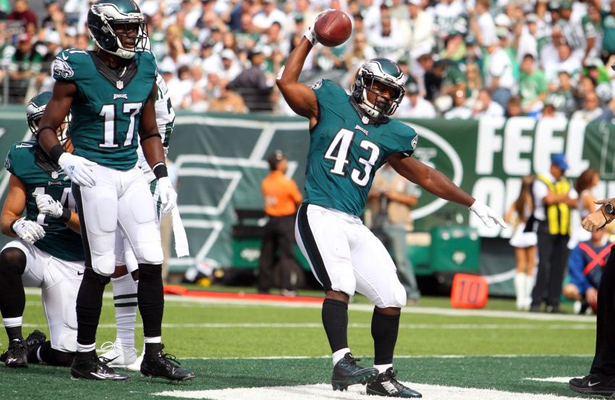Changed Flight
- Updated: September 28, 2015

It took just one attempt for everything to change for the Philadelphia Eagles.
On their third play from scrimmage, backup running back Ryan Mathews took the handoff and darted to his left. He found a hole, made one cut up the field and scampered away with a 27-yard gain before being pushed out of bounds.
The game was just three minutes old and it may not have seemed like a big deal, but it was.
This was, after all, a team that rushed for only 70 yards in its first two games – both losses – and has been facing mounting criticism over how coach Chip Kelly seized control of the team’s personnel decisions and tweaked his roster in a disruptive offseason. That 27-yard rush set the tone Sunday in Philadelphia’s 24-17 victory against the New York Jets simply because the team showed then that it was returning to an old formula.
After the Eagles (1-2) offensive line struggled to open rushing lanes in the team’s first two games, Philly shifted its strategy Sunday, and those outside zone rushing plays were instrumental in gaining chunks of yards against a tough Jets defense.
In outside zone plays, the entire offensive line plows toward to the side of the running play and each lineman is responsible for blocking an area, as opposed to a specific player.
The tactic put Mathews and fellow running back Darren Sproles out in the open field near the sidelines, where missed tackles led to big plays. The Jets (2-1) had no answer.
Mathews ran for 108 yards on 25 carries and also caught two passes for 20 yards and a touchdown, while Sproles added 17 yards on 11 carries and one touchdown.
But there’s an uncomfortable question Philadelphia now faces. All this production in the rushing game came with prize signing DeMarco Murray on the sideline with a tweaked hamstring suffered late this week. After committing five years and $40 million to Murray, was he worth it? And, can Philly’s offense get the same kind of production once Murray is fully healthy?
Murray has struggled woefully in Philadelphia’s first two games, rushing for just 11 yards on 21 carries.
Kelly said Sunday he likes Mathews’ “style in terms of how it fits with what we’re doing,” but it’s clear Murray will still have a role in this offense once he’s back.
“I knew what I was signing up for when I signed with the team,” said Mathews, who also signed with the team this offseason. “Both of them are great running backs. I just tried to wait for my number to be called.”
After Sunday’s performance, it may get called more often, but it’s not fair to pin Philly’s rushing ineptitude in its first two games all on Murray.
The Eagles did run some outside zone plays in their first two games, especially last week against the Dallas Cowboys. But the problem was that the offensive line allowed Dallas’ defensive linemen to slash into the backfield far too easily.
“Today, we blocked it,” left tackle Jason Peters told USA TODAY Sports. “Point blank. We executed it. The first couple of weeks were trying too many techniques and stuff. We had to throw all that out the window and go back to what we knew.”
The expectation is that once Murray returns, he’ll give the Eagles another wrinkle the team can use in those outside zone plays. But the implication is clear: The offensive line needs to make it work for any of Philadelphia’s running backs to have success.
“It has nothing to do with the running backs,” right tackle Lane Johnson told USA TODAY Sports. “It all has to do with the offensive line getting it done to create the holes, because those guys – the running backs – they can get it done, no matter who it is. We just have to get it done up front first.”
It certainly wasn’t flawless. But Philadelphia’s return to outside zone concepts helped secure the team’s first victory. And with the Dallas Cowboys (2-1) dropping their game Sunday against the Atlanta Falcons, the Eagles are right back in the chase for the NFC East crown.
